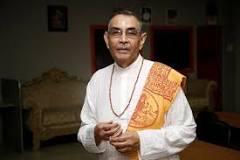Speaking and living in the abstract is the modus operandi of the intellectual class in the community. They don’t have to visit the mandir and write about Holika Dahan and Phagwa or highlight the contribution a pandit has made toward the dharma. Such an act is too demeaning and gross.
Last week I covered a National Day of Prayer to Lord Hanuman on Carnival Tuesday at the Dattatreya Yoga Center, Carapichaima, Trinidad. It is a forerunner to the arrival of Swami Ganapathi onMarch 25 for the celebration of Ramnowmi and the observance of Hanuman Jayanti and to conduct a Rudra Pooja, the first of its type in the country.
In that article I presented videos of Gyan Ramlogan and Sone Ramnath, both ardent and dedicated workers for Dharma in the country. I also covered the contribution that Ramhit Bhimsingh has been putting out to celebrate the 26th anniversary of Akhand Bhajan and Gayatri at his home in Boodoo Trace under the banner of the Penal Hindu Youth Organization.
Regrettably, many of our political thinkers and philosophers fail to see value in these events and are more ready to REACT to global issues. These philosophers and thinkers do not shape the agenda but only make comments on the wings.
The big challenge is to build institutions to serve the community. This is exactly what Gyan Ramlogan and Ramhit are doing. They live in the community and want to preserve its cultural identity!
The Sanatan Dharma Maha Sabha of Trinidad and Tobago is one such organization. Formed in 1952 to serve the welfare of the Hindu community, the Maha Sabha not only built schools and mandirs but also challenged the State in court for perceived discrimination and won in many instances. For example, the Maha Sabha’s application for a license to operate a media house was denied by the State and the Maha Sabha took its grievance to the courts -all the way to the Privy Council and won. Had the Maha Sabha not been a dynamic organization, its application would have been consigned to the dustbin of history.
Organizations are only formed when a few individuals can surrender their egos to work with others. Today that remains a big challenge as most who advocate for change chose not to belong to a mandir, yet, having all the solutions for the ills of the community!
The current leadership crisis in the UNC is because the party lacks a critical mass of conscious members to bring about change within the party. The fact that Roodal Moonilal and Vassan Bharat were defeated by Kamla Persad Bissessar is not a plus for her but a statement of the weakness of the community, If those who advocate for a change in the leadership were registered members of the party, they would have cast their votes for the change they desire. Unfortunately, registering with a political party like the UNC appears to be a too demeaning task for them. Nevertheless, they reserve the right to critique and condemn all. It’s the working of the minds of those who feel too good to associate with the community.
Pandit Dr Rampersad Parasram is now serving as President of the Pandits’ Parishad of the Maha Sabha. A retired clinical psychiatrist, Dr. Rampersad Parasram served as a senior administrator in the medical field. He was also active in the cultural sphere which included first chairman of Divali Nagar. He was also the first chairman of the United National Congress.
Only few of our academics and professionals can claim similar commitment to the welfare of their community and the nation at large. Most importantly is his all-embracing personality that strives to build bridges by embracing and working with all. He embodies the popular statement made by President Abraham Lincoln “With malice toward none, with charity for all…”
Many of us are proud of Prime Minister Narendra Modi and the positive development his government is making not only to India, but the entire world order given India’s role as chairman of the G20 nations. Had Modi not been a member of the RSS, a volunteer organization that is dedicated to serving the welfare of India and her citizens, he would not have risen within the ranks of the BJP.
No great leader brought about social change by blogging and tweeting. It was by mobilization of the masses that they effected change. Whether it was Mahatma Gandhi, Mao, Basdeo Panday or Cheddi Jagan, they were all rooted among their people.
I am not against thinking and writing but enthusiasts can also embrace activism within their community. The attitude of our middle-class professionals and academics was unconsciously adopted from the British expatriates who came to the colonies to serve ‘heathens’ with the full knowledge that back home they had their sporting, social and cultural clubs to serve their welfare.
